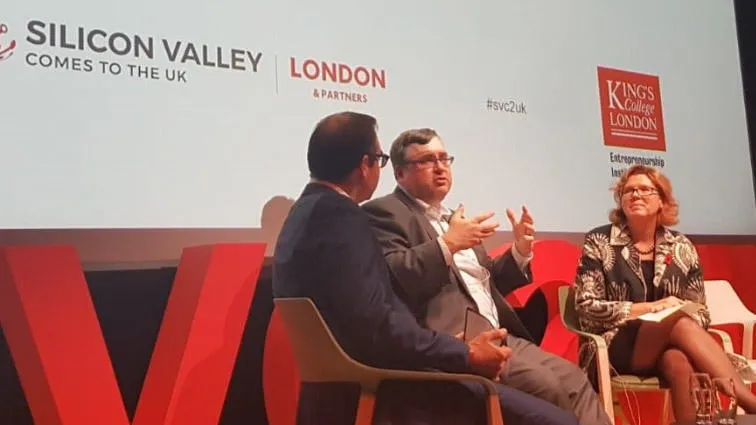09 November 2018
Lessons in Technology and Entrepreneurship from Reid Hoffman
Reid Hoffman, the veteran American tech investor and co-founder of LinkedIn, spoke to a packed audience at King’s this week (7 November). We highlight the most important messages for investors.

Hoffman discussed technology and entrepreneurship as part of a Silicon Valley Comes to the UK (SVC2UK) event, held in partnership with the Entrepreneurship Institute, King’s College London. SVC2UK is a series of invitation-only events that bring together investors, serial entrepreneurs, first-time CEOs, policymakers and students to inspire entrepreneurship, innovation and economic prosperity.
Artificial intelligence: saviour or villain?
Advances in artificial intelligence (AI) present a wealth of new opportunities – and threats. However, as a techno-optimist – one who believes “you can build a technology to create a brilliant and awesome future, but you have to work at it” – Hoffman views AI as having significant potential to transform the world.
“One of the mistakes in this discussion is that it tends to be a little bit too precise,” Hoffman explained, referring to predictions that AI will replace all middle-class jobs tomorrow. “That’s not the way it’s going to work. There are a lot of moving parts.” A more helpful framework, according to Hoffman, is “to start sketching the ways in which the technology can be applied to utopic outcomes”. “You need to work people past the fear response” and present AI as a steer to utopia, Hoffman suggested – such as by pointing out that every mobile phone camera can be turned into a melanoma detector, an innovation that would create an incredible change of outcomes in medicine.
Take the future of work. “We should be thinking about how AI would transform the work landscape and what you would need for skilling and reskilling [employees], for the creation of entrepreneurial opportunities,” Hoffman said. “Part of entrepreneurship is not just the creation of jobs within companies themselves, but also the creation of networks (like SVC2UK) that can also create the other jobs of the future. How would those be working together with technology?”
How to ‘blitzscale’ responsibly
What can investors do to ensure their investments benefit humanity? “When you’re working with entrepreneurs in any field – including AI and software – that can have a significant impact on the world and society, make sure you’re working with people to whom the social mission is super-important,” Hoffman advised. That mission must be “part of the dialogue and discussion”.
In his new book Blitzscaling, published in October 2018, Hoffman stresses the importance of responsible ‘blitzscaling’ (pursuing rapid growth by prioritising speed over efficiency in the face of uncertainty). At the event, he prompted those who are developing companies at speed to think about “how you start factoring in risk analysis and risk mitigation, while still moving at speed as you get to scale”. “When you become a multi-trillion-dollar organisation, how do you add that risk mitigation?” he asked.
“Commit to forms of transparency,” Hoffman urged. “That doesn’t necessarily mean revealing your secret sauce,” he noted, highlighting the growing numbers of tech companies that are publishing their diversity numbers. Instead, ask: “How are you thinking about the social and ethical impact of what you’re doing, and publicising it, so people can engage in conversation with you?”
Hoffman identified three categories of massive risk: causing significant harm to individuals, large groups of people or systems. “From the very beginning, you should be thinking about those risks,” Hoffman warned. “As you scale, you should make sure that you have people who think about those risks. You should have one or two people whose job it is to think about this.”
If you are an investor and would like to find out more about the ventures in theKing’s20 Accelerator, part of the Entrepreneurship Institute, please do get in touch with Ed Halliday, Head of Ventures (edward.halliday@kcl.ac.uk).
We have investor events running throughout the year, including investor breakfasts, where you can meet our latest cohort over coffee and pastries in our workspace, and network with other investors.
